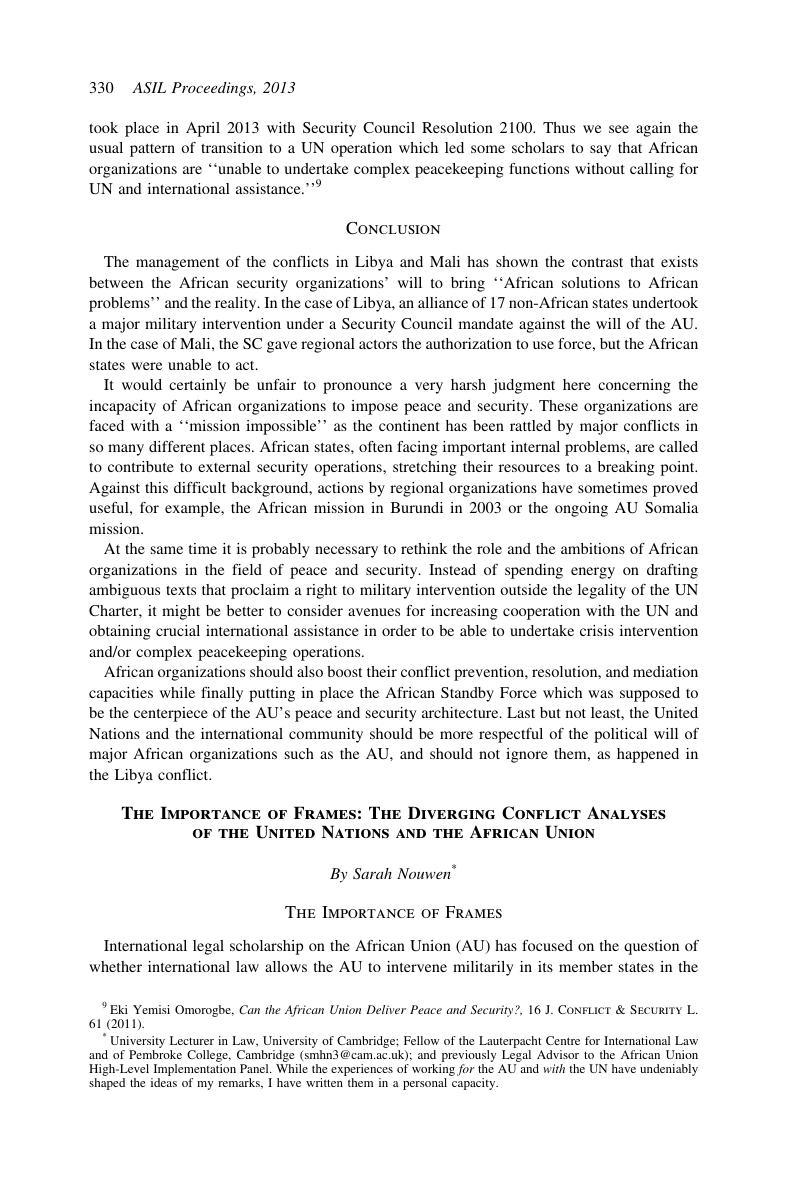Published online by Cambridge University Press: 20 January 2017

1 Constitutive Act of the African Union art. 4(h), July 11, 2000, 2158 U.N.T.S. 3.
2 Id., arts. 4(h), (j).
3 de Waal, Alex, African Roles in the Libyan Conflict of 2011, 89 Int’l Aff. 365, 369 (2013)CrossRefGoogle Scholar.
4 Srinivasan, Sharath, The Politics of Negotiating Peace in Sudan, in Pe Acebuilding, Power and Politics in Africa 195, 205 (Curtis, Devon & Dzinesa, Gwinyayi A. eds., 2012)Google Scholar.
5 See Nouwen, Sarah M.H. & Werner, Wouter G., Doing Justice to the Political: The International Criminal Court in Uganda and Sudan, 21 Eur. J. Int’l L. 941 (2010)CrossRefGoogle Scholar.
6 See, e.g., Keen, David, Peace as an Incentive for War, in Pe Acebuilding, Power and Politics in Africa 31 (Curtis, Devon & Dzinesa, Gwinyayi A. eds., 2012)Google Scholar.
7 Both the UN and the AU consist of various organs. If we were to focus on the UN Security Council (SC) on the one hand and the AU Peace and Security Council (PSC) on the other, we face the difficulty that these organs do not fulfill the same role within their organizations. Moreover, the bodies are often internally divided. Nonetheless, the dissent of a few does not mean that one cannot speak of a PSC view or an SC view altogether.
8 The Sudan file may be special, given the unique role played by the African Union High-Level Panel on Darfur, introduced below, and its successor, the African Union High-Level Implementation Panel, in analyzing the conflict, and spelling out and implementing policy recommendations.
9 See, e.g., Communiqué of the African Union, Peace and Security Council, 175th Meeting, Addis Ababa, Ethiopia, PSC/PR/COMM(CLXXV), Mar. 5, 2009, para. 5; Communiqué of the African Union, Peace and Security Council, at the level of heads of state and government, 207th Meeting, Abuja, Nigeria, PSC/AHG/COMM. 1 (CCVII), Oct. 29, 2009, para. 5.
10 Report of the African Union High-Level Implementation Panel on Darfur (AUPD), Darfur: The Quest for Peace, Justice and Reconciliation, attached to PSC/AHG/2(CCVII), 2009.
11 Communiqué of the African Union, Peace and Security Council, at the level of heads of state and government, 207th Meeting, Abuja, Nigeria, PSC/AHG/COMM. 1 (CCVII), Oct. 29, 2009, para. 1.
12 Communiqué of the African Union, Peace and Security Council, 142th Meeting, Addis Ababa, Ethiopia, PSC/MIN/COMM CXLII Rev.1 (2008), July 21, 2008, para. 3.
13 Report of the African Union High-Level Implementation Panel on Darfur (AUPD), Darfur: The Quest for Peace, Justice and Reconciliation, attached to PSC/AHG/2(CCVII), 2009.
14 Id.
15 Nouwen, Sarah, The International Criminal Court: A Peacebuilder in Africa?, in Peacebuilding, Power and Politics in Africa 171, 183–84 (Curtis, Devon & Dzinesa, Gwinyayi A. eds., 2012)Google Scholar.
16 Laurence Boisson de Chazournes, Les relations entre organisations régionales et organisations universelles, Recueil des Cours 313 (2011)Google Scholar, 347 (2010).